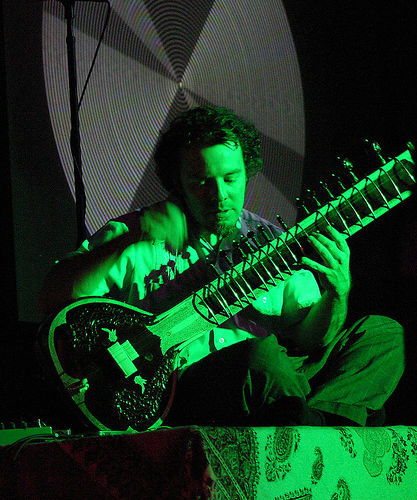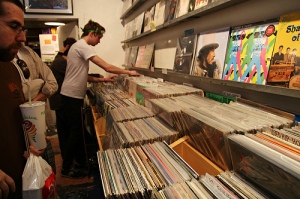Given the current chaos in the music industry, bands must find new ways to promote their music. From musicians using Twitter to connect with fans or partnering with brands to cross promote, we are seeing more and more examples of non-traditional music promotion and distribution. The artists who are willing to take risks and think outside the box, with their art and with their careers, are the ones we here at Evolving Music are most interested in.
One such band is Thievery Corporation. In addition to being a refreshingly unique group that fuses together a plethora of genres and cultural sounds, they are not afraid to speak their minds. Sure, everyone likes a good mindless “bump ‘n’ grind” tune from time to time, but you gotta respect the artists who choose to use their music not just as entertainment, but as a way to communicate what they believe and are passionate about (as we’ve covered in previous posts about artists such as Immortal Technique and Bataka Squad.)
The DJ duo, comprised of Rob Garza and Eric Hilton, hails from Washington DC, which “has long been the home of a music subculture legendary for fierce independence, a staunch do-it-yourself work ethic, and conscientious social activism.” They definitely practice what they preach. The organic multi-cultural sounds of dub, reggae, lounge, afrobeat and Indian music, to name a few, may catch your attention at first if you hear Thievery’s music at a neighborhood cafe or in a European nightclub. But, their uninhibited socio-political messages and passionate desire to open hearts and minds will keep you riveted.
Additionally, their diverse team of collaborators – singing in numerous languages, playing funky instruments, and each adding their own cultural thread to the musical quilt – give the band a truly unique sound. Not to mention their live shows, which can be pretty freakin amazing.
Photo by openeye
Their upcoming album, Radio Retaliation, purportedly takes their politicizing to a new level. According to Rob, “There’s no excuse for not speaking out at this point, with the suspension of habeas corpus, outsourced torture, illegal wars of aggression, fuel, food, and economic crises. It’s hard to close your eyes and sleep while the world is burning around you. If you are an artist, this is the most essential time to speak up.”
If you are on Facebook or iLike you’ll be able to stream Thievery Corporation’s new album on September 19th, before its official release on September 23rd. This is the first time the two social networking giants have ever worked together to promote an album.
Given that this album is particularly focused on the band’s disgust with the current state of American media, their decision to skip the middle man and go straight to their fans via the internet is appropriate, both for them personally and for the industry as a whole. According to Hilton, “We chose iLike as the platform to debut this record because it offers us a direct vehicle to share our music and communicate with fans worldwide, free from editorializing or whitewashing of our messages.”
For the fans among you, or those interested in gaining further insight into the artists and their message, keep your eyes out for a series of videos in which they introduce and discuss the album, which will be available exclusively on iLike. In the meantime, check out the title track on their MySpace.
To quote Rob Garza once more, “… if you can get people to question the things around them, just a little, then that’s not such a bad thing.”
On that note, here’s the title track from their 2002 “Richest Man in Babylon” album:





